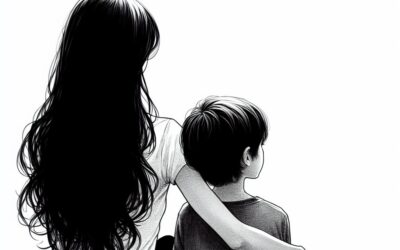by Sarah Carson—
The Enneagram personality test assigns individuals a number based on the ways they respond to the world around them.
I usually score as a Type 5, which the Enneagram Institute describes as “perceptive” and “innovative”—which I find flattering—as well as “secretive and isolated”—which I find less so.
People who are Type 5, they say, are “sensitive to the needs of others” and “protect personal boundaries.”
Put another way: If you wrong me, it’s likely I’ll disengage rather than confront you. I’ll rethink my boundaries and take a step back.
Cross someone I love, though, and you better watch out. Say, for instance, you sent a friend of yours to repair my mom’s roof when it was leaking one winter, and your friend took her money without actually fixing the roof. You better believe I will come talk to you about it. Perhaps in the middle of Christmas dinner. With all your loved ones gathered around. (I’ll admit; I probably could have chosen a better place and time for that conversation with Uncle Jo.)
Where did I pick up this behavior? As we begin this summer’s three-part Bible study, “Just love,” about how we are called to act simultaneously with love and justice, Bible study authors Christa Compton and Gladys Moore attest that one of the first places we learn about love and justice is in our families.
My family members have a deep-seated sense of fairness. My father was long involved in local politics. My mother works with those recovering from addiction. All my life I’ve watched them advocate for others and step up when they saw injustice occur. But I also inherited a propensity to sometimes react emotionally rather than rationally. I also developed a penchant for occasionally letting important things go unsaid.
In some ways, this willingness to protect the ones I love is a good thing. As Michelle DeRusha writes (p. 11), “safety is not always the better way. What looks like safety can end up entangling us.” Sometimes courage is required for justice and healing to begin.
As this month’s authors remind us, we are called to the work of making justice happen. But where do we draw the line between confronting each wrong we see in the world and also heeding Paul’s advice to “so far as it depends on you, live peaceably with all”? (Romans 12:18).
“It’s okay not to agree about even important matters. It can even be a relief to agree that we disagree,” Susie Gamelin writes (p. 13). But when “brutally demeaning others” leads to “hatred, bullying, and emotional, spiritual and physical violence”? “It must be stopped,” she writes. “There is no doubt about that.”
That line we need to walk, of course, is the same line Jesus walked when, “in his interactions with Mary and Martha, Jesus shows us that he meets us in our suffering,” our Bible study authors assert. “Jesus receives whatever we are feeling. He walks with us as we find a way forward and seek outcomes that are both just and loving.”
Love, after all, is not about settling scores or protecting oneself—it’s about protecting us all and doing good for the sake of the other.
And what is good?
“…to do justice, and to love kindness, and to walk humbly with your God” (Micah 6:8).
Sarah Carson is managing editor of Gather.
This article is from the June 2020 issue of Gather magazine. To read more like it, subscribe to Gather.
Seen. Heard. Welcomed.
Do you ever go to church hoping you have enough snacks and “stuff” to keep your child quiet and...
Redeeming grace
Coupons, rainchecks and rebates were my dad’s way of saving money on groceries and other household...
Holding to God’s promise
When my husband, Joe, and I moved into our first house In May 2014, we spied squash vines growing...





